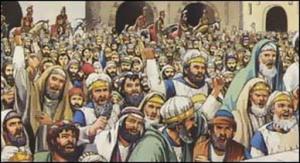
As one who “came to do God’s will,” Jesus succeeded wonderfully. But people knew Jesus as a prophet, and as a prophet he largely failed. His message about the coming of God’s Kingdom and life in God’s Kingdom fell on a lot of deaf ears.
Jesus addressed his message to Jews almost exclusively. He even instructed his emissaries not to go to Samaria or the Greek cities. That has to be an accurate memory, it seems to me. Why otherwise would the early Church, a missionary movement that had much better success among Gentiles than among Jews, write it down? But from his own people Jesus’ was able to attract only a small following.
A prophet without honor
It’s not clear how well-off Jesus’ family was. He certainly did not hail from the upper class. Jesus may have given up a meager but at least decent living when he left carpentry for the life of an itinerant preacher.
It’s also not clear how much education Jesus had. His native language was Aramaic, but he probably knew enough Hebrew to read the Scriptures. That needn’t have been very much. Jesus would have heard and learned stories of Scripture from his youth so he could probably “read” pretty accurately even if he could only make out a few words here and there. I think he could do quite a bit better than that. Still, Jesus was not schooled to the extent of a rabbi or a scribe, who would be familiar not only with scripture but also with the interpretations of other rabbis and scribes.
As a traveling lay preacher Jesus would have been invited to take a leading role in Sabbath meetings at synagogue in the towns he visited. That would have involved a reading from Scripture plus commentary. If Jesus had been a scribe, his commentary would have been filled with references to what other interpreters had said about a passage. Typically, you had to back up whatever you were saying with voices from the past. Jesus’ commentary was different. People would say he speaks like one who has authority, not like the scribes and Pharisees. Jesus’ commentaries could surprise and also disturb people.
In his hometown
Jesus came to Nazareth, where he had grown up, and went according to his custom into the synagogue on the Sabbath day. He stood up to read and was handed a scroll of the prophet Isaiah. He unrolled the scroll and found the passage where it was written:
The Spirit of the Lord is upon me, because he has anointed me to bring glad tidings to the poor. He has sent me to proclaim liberty to captives and recovery of sight to the blind, to let the oppressed go free, and to proclaim a year acceptable to the Lord.
Rolling up the scroll, he handed it back to the attendant and sat down, and the eyes of all in the synagogue looked intently at him. He said to them, “Today this scripture passage is fulfilled in your hearing.” (Luke 4:16-30)
Well, those are the words of Jesus that impressed Luke, but I think Jesus must have said more than that.
What follows in Luke’s account makes no sense to me. First, Luke says all spoke highly of him. Then some ask, “Isn’t this the son of Joseph?” It’s a way of saying, “Why should we believe this hometown boy, whom no one thought much of before? What are his credentials?”
Jesus’ response seems all out of proportion. He goes into a tirade about prophets not being accepted in their own home. He refers to two prophets: Elijah, who saved a widow from famine in the land of Sidon, and Elisha, who cured Naaman the Syrian. It seems Jesus is trying to irritate his audience by making a point of the fact that it was foreigners, not Israelites, whom the prophets helped. In this he succeeds so well that the people try to throw him off a cliff.
Luke’s point
I think Luke is combining a number of incidents into one more or less creative story. He sets the story deliberately in Nazareth, Jesus’ home town, and adds to the account the ancient miracles for foreigners because by the time of Luke’s writing the vast majority of Jews, Jesus’ own people, weren’t accepting Jesus, but a lot of foreigners were. Luke’s own audience was mostly non-Jewish.
Jesus didn’t live to see his success among the gentiles. He did see his failure among the Jews, “at home.” Of course, he succeeded with some Jews—or did he? Unsuccessful prophet story to be continued…
Image credit: Word Press, Picture Stories from the Bible, via Google Images












